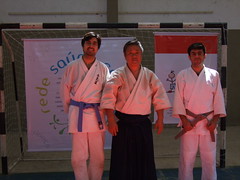
A well-rounded life? Wakata - I understand it's value.
Gaku
Homma is the owner of Domo restaurant. You may have eaten his country-style
Japanese food. Perhaps in the garden, by the koi pond. If not, consider this a
recommendation.
Restaurant
owner and chef is not Homma's first claim to fame in this town. That rests with
the fact he was the last live-in student of Morihei Ueshiba, the founder of the
Japanese martial art aikido. From 14 years old to 19, Homma lived and studied
with O-Sensei Ueshiba.
In
the aikido world, this is akin to a royal lineage and, in part, it's what makes
Homma sought after by aikido students around the world. He is happy to oblige.
He is a man curious about the ways of the world and in the many iterations of
aikido. In his younger days, Homma imagined his tombstone would bear the
epitaph: "Gaku Homma, aikido sensei." Nothing else need be said.
Homma's
training with O-Sensei lends itself to a certain romanticization. The young
pupil. The revered teacher. Boy becoming man. The reality is not as warm and
fuzzy. It could be a hard and lonely life. Homma's father sent him to Ueshiba
with a letter, which the sensei read silently before nodding, "Wakata."
I understand. O-Sensei told Homma: You have a good father.
This
is how his tutelage began.
Homma's
father had been a Shinto priest. During World War II, he became an officer. The
kind who actually stayed in an office, Homma said. Nonetheless, the rank came
with prestige. With Japan's defeat, the family's status tumbled. No sustainable
work was available for Japanese ex-military. So, what did your father do then,
I ask Homma.
"He
shined shoes," he says.
What
I knew about Homma was that he was the man who fed the homeless once a month at
the Denver Rescue Mission. He's serving his 60,000th meal there tomorrow.
Twenty years of suppers he and his students prepare by hand, deliver and serve.
On Sunday, they'll offer chicken curry with gyoza, meatballs and cabbage
sauteed in bacon.
The
milestone will be marked by a brief ceremony, and, no doubt, another
certificate, which will join the others on the wall outside the dojo. Homma
keeps the certificates to honor his students. He only displays one trophy. His
team won it bowling.
Homma
doesn't particularly like the word "homeless." In Japanese, he'll say
instead, "modern society survivor." He's picky about words. He
doesn't use "help," in context with the volunteer work he and his
students perform. And don't get him started on "cross-cultural." This
will prompt him to form a cross with his forearms and note that at the end of
the arms of a cross, people are still going in different directions and what
value is there in that?
"Do
you know the Japanese character for person?" he asks. He draws it with his
finger upon the table. Picture the letter Y. Turn it upside down. That's a
close approximation. It's a two-stroke character. The first is long. The second
is short and branches off the first.
"If
those who are better off make this first line, and those who are homeless, who
are poor, who are doing bottom-level work, make the second, you can see that we
rely upon them just as they rely upon us," he says. "Take them away and
we fall."
It's
why he prefers the word "support" instead of help. "Help is 'I
am reaching down to you,' " he says. "Support is, 'I am on your level
and I am lifting up.' "
He
says things like this to his students in Denver, most of whom are non-Asian.
"He
talks a lot while he's teaching," says his partner, Emily Busch, vice
president of Nippon Kan.
"Sometimes
too much," he says and grins.
But
he is O-Sensei's student and as Busch puts it: "He sees aikido as a way to
bring people together." Aikido cannot be practiced only in the dojo, Homma
says. It's a way of living without fear, with eyes open. "I don't go out
into the world with my shoulders stiff," he says.
This
is how teaching a few students aikido led to feeding them afterward in his
apartment led to opening a restaurant led to 60,000 meals for the homeless here
and humanitarian efforts abroad. All of it leads back to the dojo.
In
the early '80s, about five years after he moved to the United States, Homma
returned to Japan to visit his family. His father, disapproving of his son's
life as an aikido teacher, grunted: "How long are you going to hit the
tatami mat and make dust?"
"Oh,
my father only sees me as someone who makes dust," Homma remembers
thinking. His father has since died and Homma is now 60 and he thinks his
father would have been pleased with what all that dust has amounted to.
Homma
is a famous aikido teacher, but, he says, he is also a gardener and a chef and
a builder and a person committed to serving others, and all of that together makes
him, finally, truly, a sensei.

No comments:
Post a Comment